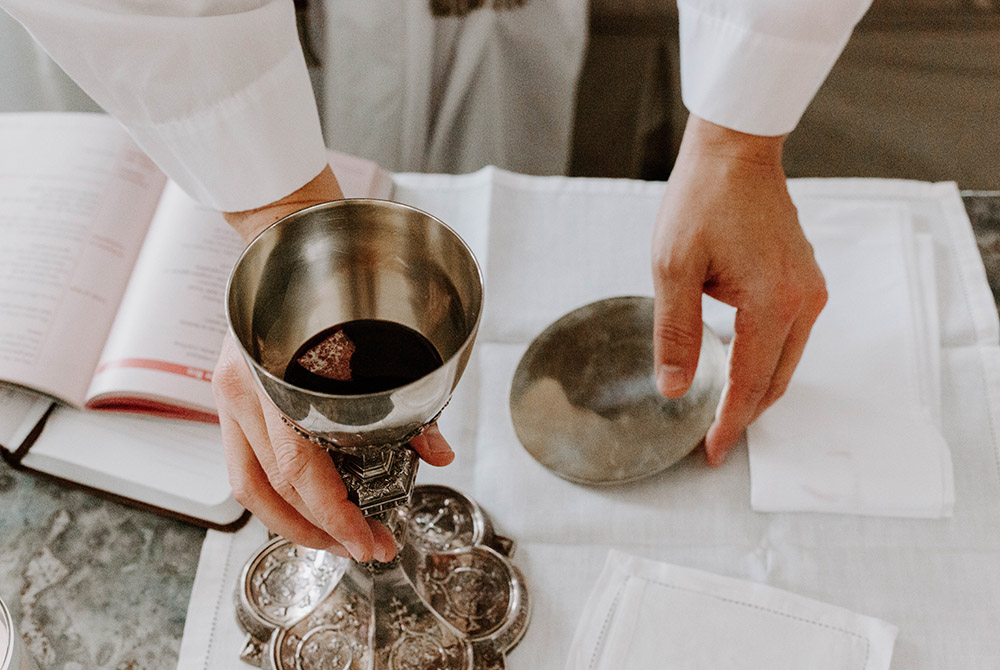
(Unpslash/Annie Theby)
Beware, lest literal interpretations blind you to deeper realities! The most incontrovertible way to identify any of us is our DNA. Precise as all that may be, such information tells others precious little about who we really are. Our mother tongue, cultural context, experience and record of recent phone calls will tell others much more about us than a genetic code. Genes are just the raw material we combine with circumstances and relationships to shape who we are.
Even without knowing my Irish last name, if I invited you to a party and promised to serve corned beef and cabbage, you could easily guess the date of the celebration. That's the sort of subtle information John gives his people in today's Gospel. When John writes about bread, flesh and blood, his Jewish audience immediately imagines unleavened bread and manna, a roasted lamb and door lintels painted with blood: the Passover and the Exodus.
One of John's favorite storytelling ploys has people misinterpret Jesus so that he can respond, often in metaphors, always with the intention of drawing them into ever-deepening relationship with him.
Throughout Chapter 6 of his Gospel, John explores Jesus' description of himself as the bread of life. John's Jewish readers would have understood that everything Jesus said after that phrase got its meaning from the context of the Passover and Exodus. The bread, the blood and the flesh/meat were treasured, holy symbols of God's covenant and love for them. Moreover, bread, the unleavened bread and the manna, linked their liberation from death and slavery in Egypt to God's care for them in the desert.
It's worth asking what so upsets the people in this scene. When Jesus said, "I am the living bread," he wasn't referring to flour and water. He was telling them that he was sent to them by God, like the manna in the desert, but much more.
The crowd that heard this, they had to choose whether or not to believe in him and his teaching about God, their father. When they faced Jesus in all his stark simplicity and humanity, they were confronted by his scandalous offer of union with God and his demand that they love one another. Many turned away. It was too simple and too demanding.
What was too simple — for many, then and now — is that God comes so near us. It feels scandalous that God wants to be for us like food, to nourish us as a mother nourishes her unborn child. In Jesus' offer to be our bread of life, God comes as close to us as possible. For some people, that is just too close for comfort. A distant God, even a fearsome God, can be easier to deal with than one who desires such intimacy.
God's simple presence to us also implies a demand. Paul explains the demand of the Eucharist in his letter to the Corinthians. He asks, "The cup of blessing that we bless, is it not a participation in the blood of Christ? The bread we break, is it not a participation in the body of Christ?"
The key word here is participation. Those who wish to be nourished by Christ's body and blood are called into communion with his lifestyle. Participation in his body and blood demands offering our lives as he did.
We pray, "When we eat this bread and drink this cup, we proclaim your death, until you come again." Those words commit us. For the followers of Jesus, verbal proclamations are meaningless unless they reflect the life of the speaker. Our way of life must reflect his or our proclamation is empty.
St. Augustine explained this with the formula he used when distributing Communion. He would say: "Receive what you are and be what you receive." We are to become what we eat. That is the demand of participation.
[St. Joseph Sr. Mary M. McGlone serves on the congregational leadership team of the Sisters of St. Joseph of Carondelet.]
Editor's note: Sign up to receive weekly Scripture for Life emails.
Advertisement








